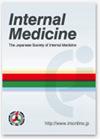Two Cases of Tumor-induced Osteomalacia Resulting in Surgical Resection during Burosumab Therapy.
IF 1.1
4区 医学
Q3 MEDICINE, GENERAL & INTERNAL
引用次数: 0
Abstract
Tumor-induced osteomalacia (TIO) is a rare paraneoplastic syndrome that results from tumors that secrete fibroblast growth factor 23 (FGF23). This leads to chronic hypophosphatemia. Burosumab, an anti-FGF23 antibody, is an effective treatment when surgery is not possible; however, it complicates FGF23 measurements and postoperative monitoring. We describe the first case report of TIO in which the responsible tumors were discovered during burosumab therapy and successfully resected. Despite tumor removal, the serum FGF23 levels remained elevated. In the postoperative monitoring of patients treated with burosumab, physicians should focus on the serum and urine levels of phosphate rather than FGF23.
布若单抗治疗期间肿瘤性骨软化导致手术切除2例。
肿瘤诱导骨软化症(TIO)是一种罕见的副肿瘤综合征,由分泌成纤维细胞生长因子23 (FGF23)的肿瘤引起。这会导致慢性低磷血症。抗fgf23抗体Burosumab在无法进行手术时是一种有效的治疗方法;然而,它使FGF23的测量和术后监测变得复杂。我们描述了第一例报告TIO,其中负责肿瘤是在布罗单抗治疗期间发现并成功切除。尽管肿瘤切除,血清FGF23水平仍然升高。在布罗单抗治疗患者的术后监测中,医生应关注血清和尿液中的磷酸盐水平,而不是FGF23。
本文章由计算机程序翻译,如有差异,请以英文原文为准。
求助全文
约1分钟内获得全文
求助全文
来源期刊

Internal Medicine
医学-医学:内科
CiteScore
1.90
自引率
8.30%
发文量
0
审稿时长
2.2 months
期刊介绍:
Internal Medicine is an open-access online only journal published monthly by the Japanese Society of Internal Medicine.
Articles must be prepared in accordance with "The Uniform Requirements for Manuscripts Submitted to Biomedical Journals (see Annals of Internal Medicine 108: 258-265, 1988), must be contributed solely to the Internal Medicine, and become the property of the Japanese Society of Internal Medicine. Statements contained therein are the responsibility of the author(s). The Society reserves copyright and renewal on all published material and such material may not be reproduced in any form without the written permission of the Society.
 求助内容:
求助内容: 应助结果提醒方式:
应助结果提醒方式:


